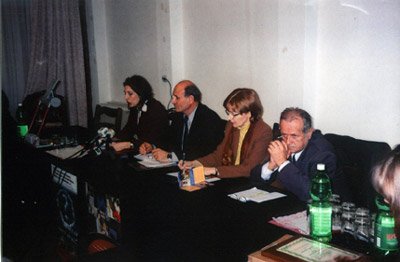The Republic Center for Support of Persons with Intellectual Disability – PORAKA, within the national campaign for support of the employment for persons with intellectual disability under the motto “WHAT ABOUT MY RIGHTS?” on 16th of December 2004 in Skopje held a round table on the subject “Support of the employment for persons with intellectual disability in R.Macedonia”.
Participants on the round table were representatives from: The Ministry for Labour and Social Policy, Inter-Party Parliamentary Lobby Group for the Rights of Persons with Disability, the Agency for Employment, the State Inspectorate for Labour, the National Coordinative Body for Provision of Equal Rights of Persons with Handicap, the Center for Social Work – Skopje, the Institute for Mental Health – Skopje, the Secondary School “Naum Ohridski” – Skopje and the Secondary School “Iskra” – Stip, the Union of Organizations of Disabled Persons in Macedonia, representatives of the local authorities and representatives of the local organizations of PORAKA.
After the introduction presentations and the discussion, the participants of the round table unanimously adopted the following:
- Consistent use of the Regulative for the Assessment of the Specific Needs of Persons with Physical and Psychological Disability.
Compliance with and practicing Article 10 from the Regulation when establishing the level and the type of the specific needs in order to provide recommendation for education, rehabilitation and vocational training in institutions that are registered for that purpose.
Educational neglect or border case and others that are not included in Article 10 of the Regulation, should not be established in the official document of a professional body. - The Law for Employment of Disabled Persons (Article 2, Paragraph 1) allows opportunities for employment of persons with mild intellectual disability, excluding the other persons with intellectual disability from realizing the constitutional right to employment.
Changes and amendment of the Law for Employment of Disabled Persons is necessary, because of provisions of possibilities for employment of persons with intellectual disability according the working ability, regardless the level of intellectual disability.
PREPOSITION: Article 2, Paragraph 1 should state: “Disabled person, within this Law, is a person with impaired sight, impaired hearing, impairments in the voice, speech and language, physically disabled person, person with intellectual disability, person with multiple disabilities and a person with psychosis that, because of the level of disability, has specific needs in the work.” - In order to decrease the possibility from exploitation, when paying the salary of the persons with intellectual disability, authorized representative of the saving account or checking account should only be a member of the closest family of the employed person with intellectual disability or the guardian.
- Introduction of a quota system for employment of persons with intellectual disability on the open labour market.
- Strengthening the mechanism for monitoring and control of the relationship of the employer towards the employed persons with intellectual disability.
- Decreasing discrimination and prejudice towards persons with intellectual disability included in the working process.
- Involvement of the organizations of persons with intellectual disability when developing strategies for important issues related with the right of employment for persons with intellectual disability.
- Coordination and close cooperation between the competent bodies and factors is necessary for overcoming the inconsistencies in the realization of the right of employment for persons with intellectual disability.
- The Ministry of Labour and Social Policy should authorize the Republic Center for Support of Persons with Intellectual Disability – PORAKA and its local organizations to conduct insight and monitoring of the conditions regarding the realization of the rights and obligations of working relation for the persons with intellectual disability.





